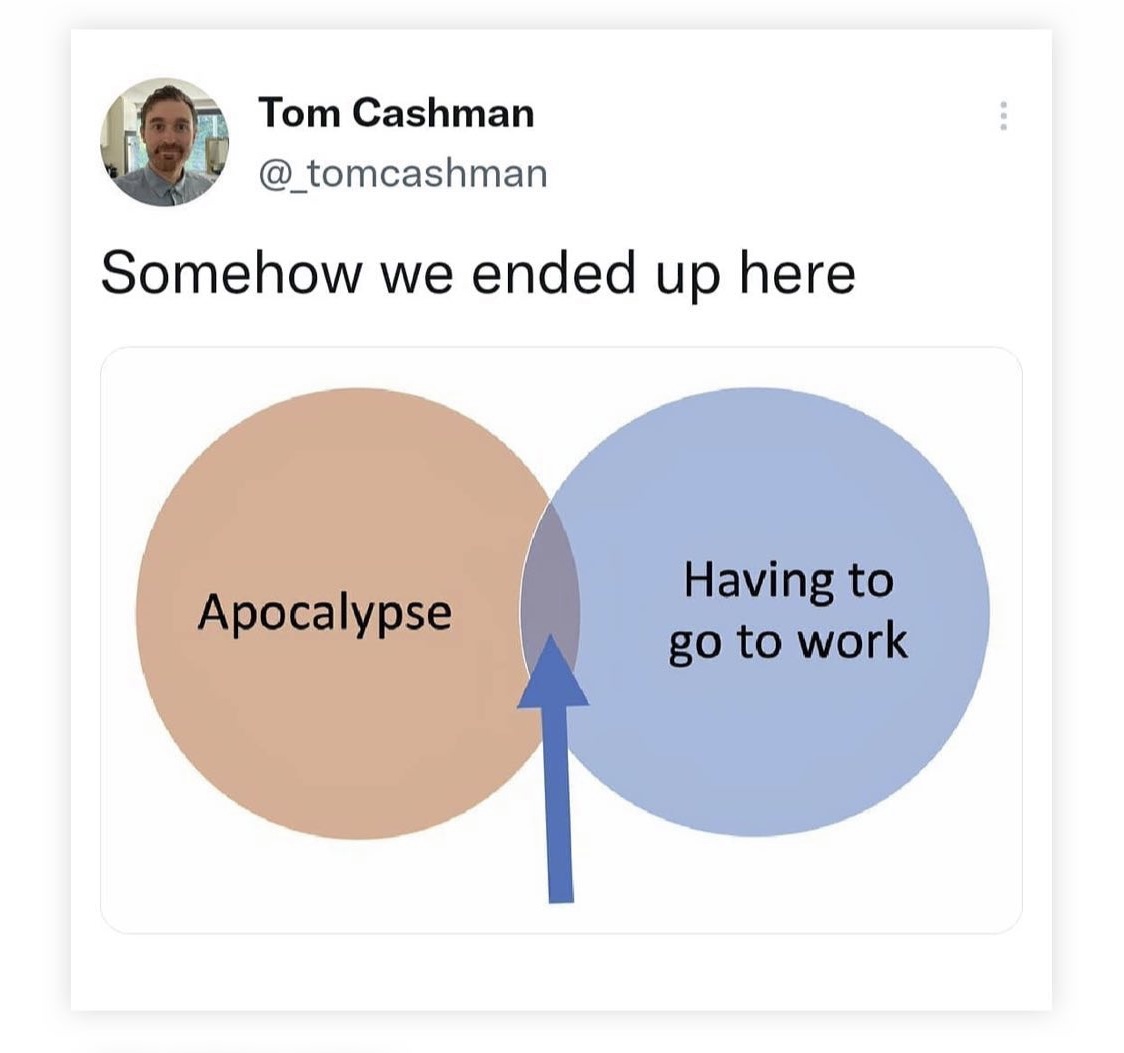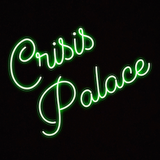94: Downward trajectory
Living with the knowledge that things are going to get much worse in your lifetime

This one's a little dark so enjoy this nice picture of a rabbit. To be exact, a Young Hare, by Albrecht Dürer, 1502
--
One of the takeaways from the IPCC's sixth assessment is something that I had always been aware of on some level, but the report put such a fine point on it that it's been this little nugget of doom I've been carrying around with me and thinking about in the past week.
That is, no matter what the world does, we are locked into 30 years of worsening climate impacts. The reason being, the world has already warmed by 1.1 degrees Celsius since the 19th century, and we've pumped so much carbon into the atmosphere, and the atmosphere and the ocean are so enormous, that you can't just slam on the brakes and stop these global processes that have been set in motion. So even if starting today, we did everything 100% right—no pipelines, no combustion engines, no coal plants, no gas stoves—all of this *waves hands about* will continue to get worse until at least 2050. Hurricanes, flooding, sea level rise, fires, heat waves, winter storms, blackouts, melting ice sheets, worse, worse, worse.
I am 43 years old, so let me get the old calculator out, in 30 years if all goes according to plan I will be 73 years old. But you know people are living longer these days so if I eat my spinach maybe I've got a good good run left and in my golden years I just start to see us get this climate change thing under control. But wait a second, that is definitely not going to happen because we definitely aren't doing everything right, and probably won't for some time spoiler alert. So that means that, by certain measures, for the rest of my life, each decade will bring more extreme disasters than the decade before. And then I'll die zzzz goodbye. And even if we all do a really, really good job during the rest of my life, I'll have been dead long before the climate begins to somewhat stabilize if it does at all. It might keep getting worse for another 50, 100 years after that for all I know.
I know that is a grim way to look at things, and also pretty self-centered. After all, there are far more reasons to try to make the world a better place than securing your own personal comfort during old age. You know, leaving the world a better place, etc. But mainly I'm using my own lifespan as a ruler to demonstrate the very long, very slow, very unsatisfying march of progress.
It's rare that we get such scientific certainty of failure, but this little exercise is a good representation of the way I and probably a lot of people have been feeling about a lot of things in the past week, which is to say, that they are going to get a lot worse before they get better. That certain measures of progress and quality of life seem like they will be on a downward trajectory for as long as we have the good fortune of being a human on earth.
That, again, may sound dramatic, and I know speaking with these kinds of certainties is a fool's game for anyone who doesn't want to sound like an idiot in a week or so. But what I'm trying to do is put my finger on the way things feel right now. And this week really did feel like another one of those moments where you have a clear view of the trajectory of history, like Paul Atreides when he chugs a bunch of spice, and that things are really not looking good.
I don't think I need to fully recount what I'm talking about, but for one the country has been besieged by stacked natural disasters: wildfires in California/Nevada, deadly flooding in Tennessee, tropical storm Ida, which ravaged the Gulf Coast as a category 4 hurricane, one of the strongest to hit Louisiana in 165 years, then moved up to the Northeast where it killed dozens more, inundating streets, subways, homes, even an elevated highway, and turning basement apartments into death traps.
On the political front, Thursday was a reminder that, though we felt some sense of reprieve when Trump was denied a second term, we're still very much living in the country that produced him, and the steady dismantling of democratic guardrails hasn't even slowed. Namely, the Supreme Court did not take action to halt the Texas abortion ban, though it is certainly unconstitutional, signaling to many that we are on a path toward legal abortion no longer being the law of the land in the United States in the year 2021, a retrograde turn of events that would set us back 50 years in the nation's history, and put us in an exclusive club of patriarchies and theocracies most of which you would not categorize as free or democratic. Which sounds shocking unless you realize that several states in the union have, for all practical purposes, already been at this point for years.
If that were not bad enough, the Democratic senator who likes to shoot climate change bills with a gun indicated he would not support the $3.5 trillion budget reconciliation bill that has been almost comically tasked with carrying the full weight of the Democratic agenda, despite the party theoretically controlling both chambers of the legislature and executive branch. Not only that, for many people who are not me, it was also carrying the hope that there remains a centrist, bipartisan path to federal policy that would patch our physical and social infrastructure and take even pitiful little baby steps toward climate mitigation. All things that, by the way, the majority of the country supports, but can never pass under our system of strengthening minority rule.
And so, many of us found ourselves in this moment of recognizing what seems surely to come, which is, bad shit. Another disastrous election in a few years, more political violence, more medieval state laws, more cars driving into protests, more fires, more floods. And maybe the worst part is, all of this is happening in a time when it feels like we are actually making progress toward a multiracial democracy. In fact, we know that much of this backlash is actually happening because we are making progress. And that is leaving many of us with emotions. Mainly, I think, a kind of sadness at this gauntlet of tragedy. But also anger, frustration, helplessness.
This flood of feelings right now in some way betrays a level of privilege to have been sheltered from them in the first place. There's a certain whiteness to this kind of melancholy. "How do I manage my climate dread" we ask over and over, the only real answer being, well, you don't, so buckle up. But this is also a ride with ups and downs for all of us. To varying degrees, there will always be a gap between any macro-level rotten state of affairs and your day to day state at any given time. For example, though no decade in the rest of my life will be less disastrous than the one that came before it, I'll continue to have good days, I will go on nice vacations, see beautiful things, spend time with people I love, laugh, watch movies, read books. And on the flip side, I will keep having to do quotidian stuff to continue being of use to the economy. I will still have to circle back on that email.
This meme comes to mind, which was making the rounds over the week, and really was how it felt:

Or this tweet that seemed to hit right on Sept. 2:

Even setting aside the particular devastation of the past five days or so, this is a sensation that anyone who considers themselves a progressive or an activist or otherwise pushing back against the worst aspects of the world will be familiar with. We do experience transformative change, but it's rarely linear or lasting, and even tangible advances get engulfed by new abuses of power, or dwarfed by a much larger struggle. In his history of abolitionists in the British Empire, Adam Hochschild ties the movement back to a meeting of a dozen people at a London bookstore and printing shop in 1787. Though the effort gained momentum very quickly, the British slave trade continued for another 50 years, another 25 in the United States, and it would be another 100 years until we nominally achieved racial equity under the law with the Civil Rights Act, and even still, elements of slavery continue through the prison system and worker exploitation.
In a recent interview on the Ezra Klein Show (dollar in the Ezra jar), Ta-Nehisi Coates and Nikole Hannah-Jones were describing the power play that landed them in faculty positions at Howard University, after Hannah-Jones was denied tenure at UNC as a result of a racist backlash against her work on the 1619 Project. The move was largely celebrated, but Coates described how they almost immediately received criticism regarding poor working conditions at Howard University.
"At first I was like, can I just get a second of peace man? Do you know how hard it was to get this done? But as I thought about it, I think the conversation reflects something true about life, that this is what it is, it’s constant struggle. Question after question after question. There is no place where you reside and you get to feel like you are the good guy in the story."
So one one level, dejection over a setback on any one issue is a perfectly valid emotional response and often a form of grief in response to real-time harm. But taken too far, it misunderstands the nature of progress, a misinterpretation that moderates often make about social movements—that they exist to tick off a box.
In her collection of speeches and interviews Freedom is a Constant Struggle, Angela Davis emphasizes the danger of fixating on leaders triumphing within movements because "they tend to enact historical closures. They are represented as historical high points on a road to an ultimately triumphant democracy; one which can be displayed as a model for the world; one which perhaps can serve as justification for military incursions..." Posing progress as an endgame, in other words, presumes an eventual perch atop a hierarchy. A better framing is movement struggle as a series of continuities instead of closures, continuities that span both time and location. For example, she points out, the Black Panther Party's Ten Point Program from 1966—which demands things like freedom, housing, education, health care, and an end to police brutality—mirrors 19th century abolitionist agendas (and today's Movement for Black Lives agenda, for that matter). It never ends, nor should it.
In that same interview, Nikole Hannah-Jones laments that people are viewing the 1619 Project as an effort to teach people to hate whiteness, because "even at the darkest moments in this country, there was also always a biracial, sometimes a multiracial group of citizens, who are pushing for it to be better. Who were fighting for this country to live up to its highest ideals." I find that connecting with that continuity to be sincerely, profoundly comforting—it is to not be alone.
I bring you platitudes that may be cold comfort, but you know what, sometimes they are classics for a reason. So I will leave you with one more, which is the fact that solace does happen within the struggle, in the pockets of community that we temporarily carve out within unjust systems. That is not always the case, and I've definitely had jobs working on progressive issues that replicated systems of oppression far more than they created communities of care. But if you're doing it right, movements prefigure the world we are trying to create, and keep you going. As Alexandra Ocasio-Cortez said Thursday, "It feels better to be in movement."

You can read a dual meaning in the phrase "freedom is a constant struggle." One, that achieving freedom involves a struggle that never ends. But you can also read it as a belief that we achieve freedom in the struggle itself. That there is freedom in knowing its perpetuity and in the process itself. Davis was once asked how she has stayed optimistic over all her decades of being an activist:
Well, I don’t think we have any alternative other than remaining optimistic. Optimism is an absolute necessity, even if it’s only optimism of the will, as Gramsci said, and pessimism of the intellect. What has kept me going has been the development of new modes of community. I don’t know whether I would have survived had not movements survived, had not communities of resistance, communities of struggle. So whatever I’m doing I always feel myself directly connected to those communities and I think that this is an era where we have to encourage that sense of community particularly at a time when neoliberalism attempts to force people to think of themselves only in individual terms and not in collective terms. It is in collectivities that we find reservoirs of hope and optimism.
--
Links
- Three days before Manchin threatened to kill the $3.5 trillion economic plan, this article ran about a massive corporate lobbying effort to kill the $3.5 trillion economic plan.
- Rebecca Solnit on the Texas abortion ban, which "seethes with violence and lies."
- “The only way to understand the court’s action is that there are five votes to overrule Roe vs. Wade."
- “I thought someone would swoop in and save this from happening. I am worried, that’s an understatement — and I feel ill.”
- Record shattering rainfall turned New York basement apartments into death traps.
- New York invested billions in storm protection since Sandy, but it did little to stop this week's flooding, because it had been focused mainly on storm surge from the coast, not rain flowing downhill. It hits you from all directions.
- Sign this petition to stop the New York Times from running fossil fuel ads.
- Andrea Campbell gets the Globe's endorsement for mayor. I'm voting for Wu, but would be thrilled with Campbell too I wish we had ranked choice voting. (One funny thing in this endorsement is praise for Walsh for expanding housing stock, yes thank you Secretary Walsh for a million units nobody can afford and a whole new, all-white neighborhood that is going to be overtaken by sea level rise, housing is fucking awesome in boston thanks to your tireless efforts.)
- Meanwhile the worst mayoral candidate by far says she would hire up to 300 new cops in Boston, a 15% increase to an already gargantuan budget. I wish there were ranked choice voting so I could rank her last out of any person in the entire city.
- This short video about people dying in the name of freedom from vaccines is brutal.
- A 35-hour workweek trial in Iceland found that services were not impacted, stress and burnout decreased, happiness increased both at work and at home.
- If you want to read even more about air conditioning, this interview is interesting, including some skepticism about the HFC reduction plan, history of racism in terms of who has AC, and some compelling ideas about communal air conditioning solutions.
- An environmental racism scorecard ranked ExxonMobil in last place with a negative score. Hey did you guys know that I fuckin hate ExxonMobil it's true I do.
- Food banks are embracing small scale urban farms even though they provide a tiny fraction of the food they distribute. They see it as a way to strengthen their mission, build relationships and community, and form a more meaningful connection to the practice of feeding people. It struck me as a strong parallel to the value of individual lifestyle changes.
--
I endorse
Longtime readers may have noticed that I love pictures of flowers. Still life in general, but flowers in particular. Especially like kind of washed out or slightly melancholy looking flowers. Goth I know. One of my favorite instagram accounts is British florist Milli Proust. She is an amazing florist and gardener but also a great photographer of flowers. I think we could all use some pictures of flowers to look at right now so go follow enjoy.

--
Listening
What do you guys want to listen to how about RADWIMPS this Japanese emo band here's their big song from the anime Your Name which is a movie that I love.

--
A Saturday newsletter what kind of bullshit is this, you're probably wondering. Well I ran fresh out of words yesterday and had to wrap things up today. But you know what it's kind of nice to see you all on a Saturday like we decided after enjoying each others company around the office it was finally time to meet up over a coffee or do like a little group picnic in the park. I think it went pretty well, but I don't know let's not make a habit of it we all need to keep healthy boundaries so I will see you next Friday. Have a nice Labor Day and say a little thank you to unions, thank you unions.
Tate

